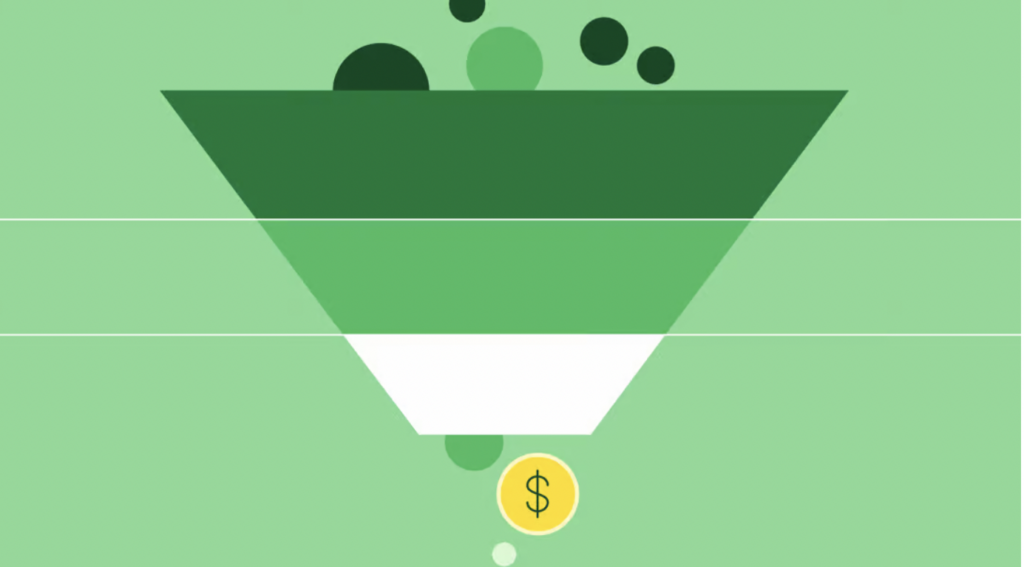In business, few things are as crucial yet often overlooked as the well-structured marketing funnel. Just as a meticulous chef wouldn’t begin cooking without a plan, no savvy business leader would take on a sales endeavor without having a clear blueprint of their target audience and marketing funnel stages.
When adeptly managed, a funnel can substantially elevate marketing efforts and bolster a company’s bottom line.
What is a Marketing Funnel?
The marketing funnel represents the journey a prospective customer embarks upon, starting from the awareness stage all the way to the decision-making point where they either become a paying customer or opt out of the process. This transition from brand unawareness to making a purchase decision is not abrupt. It flows through various stages, each requiring its unique marketing strategy.
The concept of a marketing funnel is often compared to a real-life funnel, where the top is wide and tapers down to a narrow end. This means that not all potential customers who enter will make it to the bottom. The goal of effective marketing is to guide as many possible clients as possible through each stage and, ultimately, convert them into paying customers.
The goal of a marketing funnel is clear — to increase sales. But how can you manage your customer journeys to achieve this objective?
Benefits of Segmenting the Funnel
The chief advantage of understanding and employing the marketing funnel stages is that it allows businesses to tailor their strategies to their target audience. By knowing where a potential client resides within the funnel, businesses can adopt laser-focused tactics that cater to each stage, ensuring higher engagement and conversion of prospective customers.
The Four Marketing Funnel Stages
The four marketing or sales funnel stages are based on the AIDA model – Awareness, Interest, Desire, and Action. Understanding this can help marketing and sales teams gauge which stages their potential customers are at and devise strategies accordingly.
1. Awareness (Top of Funnel)
This initial stage is where potential clients first become acquainted with your brand. The primary goal is to create visibility, and strategies may cover:
- Content marketing through insightful blog posts and articles.
- Search Engine Optimization (SEO) to rank higher on search engines.
- Leveraging social media platforms for a wider outreach.
2. Interest (Middle of Funnel)
Here, potential clients show a vested interest in your offerings. The focus shifts from mere visibility to engaging the audience and providing value. Effective strategies include:
- Email newsletters packed with relevant content for your email list members.
- Webinars and podcasts targeting your niche.
- Comprehensive eBooks or guides that solve specific problems based on customer experiences.
3. Desire (Middle to Bottom of Funnel)
Potential customers are now in the consideration stage. They need that extra nudge, the convincing reasons to opt for your product or service over others. Effective strategies include:
- Product demos or trial offers.
- Customer testimonials and case studies.
- Targeted marketing campaigns showcasing benefits.
4. Action (Bottom of Funnel)
This is the final stage, where the potential customer makes the decision. This is the culmination of all your marketing team’s efforts, and the focus is on sealing the deal. Strategies cover:
- Offering limited-time discounts or bonuses.
- One-on-one consultations or personalized pitches.
- Streamlining the sales process for ease and efficiency.
Managing the Funnel for Optimal Sales
Understanding the marketing funnel stages is merely the foundation. The real magic lies in continuously refining and tailoring strategies to boost conversion rates. Businesses should actively monitor their funnel metrics, discerning where potential clients drop off and why. Such insights allow companies to adjust their tactics, ensuring smoother transitions from one stage to the next.
The traditional linear marketing funnel has evolved. Potential clients might jump stages or oscillate between them. Thus, while the structured approach offers a blueprint, businesses must remain flexible, adapting to the nuances of their target demographic and tailoring their marketing tactics.
In Conclusion
The marketing funnel isn’t a mere theoretical concept; it’s the backbone of any successful sales strategy. By understanding, segmenting, and optimizing the distinct marketing funnel stages, businesses can cater to target customers with unprecedented precision, significantly boosting sales.
Looking to redefine your sales strategy? Feel that your marketing funnel could use an expert touch? Reach out to Markitors. Our team boasts a proven track record of devising strategies across various industries that not only align with each funnel stage but guarantee tangible results. Let us help you transform your sales numbers and set you on a trajectory for unparalleled growth. Turn your target audience into loyal customers with Markitors.
Schedule a free consultation with the Markitors team today.







